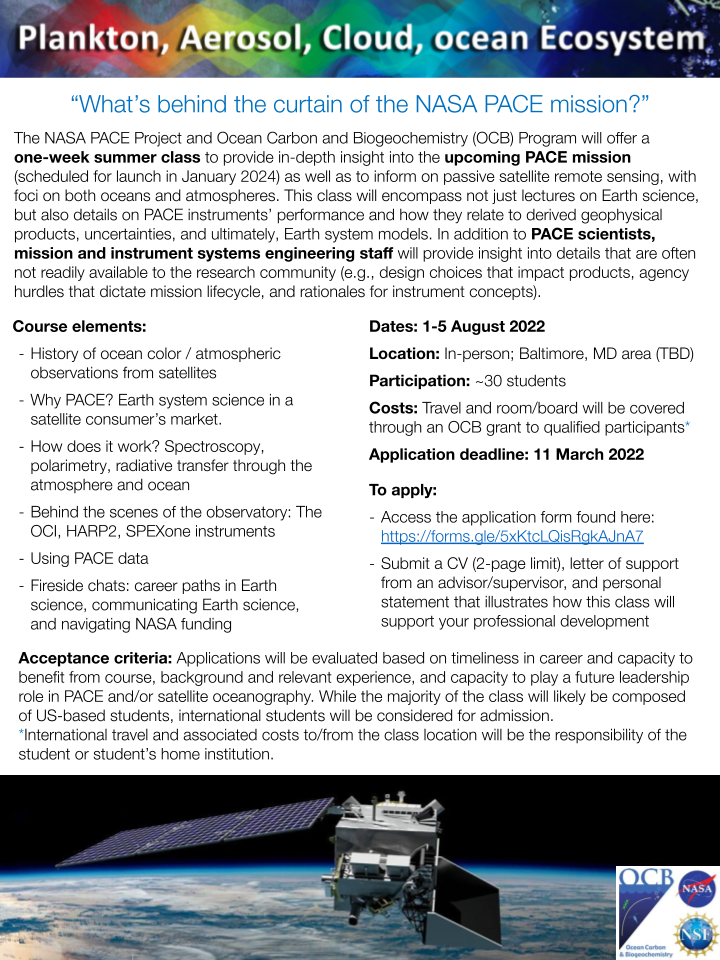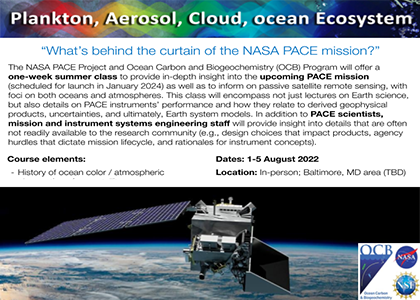What’s behind the curtain of the NASA Plankton, Aerosol, Cloud, ocean Ecosystem (PACE) mission?
The NASA PACE Project and Ocean Carbon and Biogeochemistry (OCB) Project Office are excited to announce the upcoming summer class “What’s behind the curtain of the NASA Plankton, Aerosol, Cloud, ocean Ecosystem (PACE) mission?” This one-week graduate-level course will provide in-depth insight into the upcoming PACE mission that is scheduled for launch in January 2024. The course will provide instruction on passive satellite remote sensing, with foci on both ocean and atmosphere. This will encompass not just lectures on Earth science, but also potential field trips and details on PACE instruments’ performance and how they relate to derived geophysical products, uncertainties, and ultimately, Earth system models.
Our target audience includes graduate students, post-doctoral fellows, and early career professionals (<4 years from terminal degree). Our hope is to engage the next generation of early career scientists in PACE, with the goal of equipping this next generation with specialized expertise in global Earth System passive remote sensing, as well as offering unique access to all elements of a major NASA flight project. In addition to PACE scientists, mission and instrument systems engineering staff will be accessible to share “behind-the-scenes” details that are often not readily available to the research community (e.g., design choices that impact products, agency hurdles that dictate the mission lifecycle, and rationales for instrument concepts).
Class details:
• Location: in-person only in the Baltimore, MD area (exact venue TBD)
• Timing: 1-5 August 2022
• Participation: ~30 student enrollments
• Cost: Travel and room/ board are covered via an OCB grant for qualified participants*
• Details on course elements: https://www.us-ocb.org/pace-mission-training-activity/
• SUBMIT APPLICATION BY 11 March 2022 (midnight ET)
Qualified individuals from underrepresented groups in STEM will be prioritized to promote the diversity and inclusion aims of both OCB and NASA. Application requirements include:
• Contact information
• Personal statement that illustrates how this class will support your professional development and future work (limit of 1800 characters, including spaces)
• Abbreviated (2-page biosketch format) CV
• Letter of support from an advisor, mentor, or supervisor (this should be sent directly from your supervisor to the OCB Office (hbenway@whoi.edu)
Applications will be evaluated by the organizing committee based on timeliness in career and capacity to benefit from course, background and relevant experience, and capacity to play a future leadership role in PACE and/or satellite oceanography. While the majority of the class will likely be composed of US-based students, international students* will also be considered for admission. Application decisions will be distributed by April 8.
We look forward to your participation!
Jeremy Werdell
Brian Cairns
Ivona Cetinić
Antonio Mannino
Vanderlei Martins
Lorraine Remer
Pengwang Zhai
Heather Benway
Mai Maheigan
Mary Zawoysky
*International travel and associated costs to/from the class location will be the responsibility of the student or student’s home institution.
Please share this informational flyer with your departments, colleagues, and students. Click to download PDF






